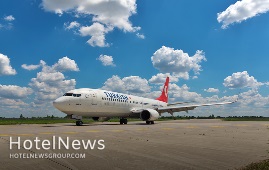
Egypt's Minister of Tourism and Antiquities announced a record-breaking influx of 14.9 million tourists to the country in 2023, marking a new milestone in Egypt's tourism history.In the final quarter of 2023 alone, 3.6 million tourists visited Egypt, surpassing the previous record set in 2010. The Minister of Tourism also highlighted a 9% increase in tourist arrivals during the first 19 days of 2024 compared to the same period last year.
Create: Feb 23, 2024 Edit: Feb 23, 2024
The Most Luxurious Hotel in Zurich Opens: Mandarin Oriental, ZurichThe Mandarin Oriental, Zurich, heralded as the city's most luxurious hotel, has officially opened its doors. This hotel is a remarkable transformation of the 185-year-old Baur au Ville, the city's inaugural luxury hotel, with a meticulous $93 million renovation. With 80 opulent guest rooms starting at 800 Swiss francs per night, the Mandarin Oriental, Zurich stands as both the oldest and newest five-star haven in the city.
Create: Feb 23, 2024 Edit: Feb 23, 2024
In a move to expand its operations in Australia, Emirates has announced it will increase its services to the country.Starting October 1st, Emirates will upgrade its second daily flight between Dubai and Brisbane (EK430/431) to an Airbus A380.This upgrade will significantly increase passenger capacity and provide a more comfortable and relaxed travel experience for passengers. In addition, Emirates will launch a second daily service between Dubai and Perth on December 1st, operated by a Boeing 777-300ER.This move demonstrates Emirates' commitment to expanding and strengthening its presence in the Australian market.
Create: Feb 23, 2024 Edit: Feb 23, 2024
Dubai further consolidated its status as a central hub for international business events in 2023. with the city winning a record 349 bids to host international conferences, congresses, meetings, and incentive travel programmes, a report said. Driven by Dubai Business Events (DBE), the city's official convention bureau, the wins reflected a robust 49% increase in successful bids compared to 2022. These events captured in 2023 are set to attract over 191,000 international delegates, Emirates News Agency, WAM, said.
Create: Feb 23, 2024 Edit: Feb 23, 2024
Ozhotels, recognized as a leading hotel group in Turkey, has signed a contract with Marriott, the world's largest hotel chain brand, to open two new hotels in Antalya. The regional manager of Ozhotels in Antalya stated: "We are proud to collaborate with the Marriott brand to open these two new hotels in Antalya."These hotels will contribute to the improvement of the tourism industry in Antalya and provide quality services to guests from around the world. The chairman of the Ozhotels board also expressed satisfaction with this collaboration, stating: "This is a significant milestone for Ozhotels.""We are collaborating with the Marriott brand, one of the most recognized brands in the hotel industry, to provide a unique experience for our guests in Antalya." The opening of these two new hotels will create new job opportunities in Antalya and contribute to the economic prosperity of the region.
Create: Feb 23, 2024 Edit: Feb 23, 2024
Exciting news from Saudi Arabia's Tourism Minister, Ahmed Al-Khatib, who revealed the country welcomed over 100 million visitors last year, achieving Vision 2030 goals.Discussions abound on the strategies behind this milestone, with experts pointing to new laws, regulations, and marketing efforts. Al-Khatib aims even higher, setting a target of 150 million visitors. Vision 2030's Quality of Life initiative and streamlined visa procedures are credited for driving tourism growth. Saudi Arabia's remarkable transformation in tourism since Vision 2030's launch positions it as a leading global destination.
Create: Feb 23, 2024 Edit: Feb 23, 2024
A new auction-based taxi service called Drife has been launched in Dubai, which can significantly reduce fares for passengersThe Drife app is the first decentralized transportation system in the United Arab Emirates, allowing passengers to view different drivers' offers for a trip and choose the best option. This system benefits everyone, as passengers pay lower fares, and drivers earn more income by eliminating commissions. Drivers pay a monthly subscription fee to use Drife.The company's app and website will be launched later this month, and initially, 100 limousines from a private company will be registered in the system.
Create: Feb 23, 2024 Edit: Feb 23, 2024
A recent study by the French National Cinema Center indicates that more than half of international tourists who visited France last year were persuaded to travel to the country after watching a French film or TV series. The study also examined the length of stay and budget of tourists. The results show that on average, Chinese and American tourists stay longer in France compared to European tourists, with their first trip to the country being their initial exposure. Among those who watched a product filmed in France, 80% said they were influenced to visit the country. This study demonstrates that television advertising, whether in the form of films or series, can be a powerful tool for attracting tourists to France.
Create: Feb 23, 2024 Edit: Feb 23, 2024
Turkish airlines , a global leader in aviation, has hailed a major move made by Türkiye to extend visa-free entry to the nationals of the UAE, Oman, Bahrain, and Saudi Arabia Tourists from these countries can now spend 90 out of 180 days in Türkiye without a vi The new visa exemption rule is set to bolster ties between Türkiye and these countries, and further strengthen the country’s tourist numbers from 2024, Turkish Airlines noted
Create: Feb 23, 2024 Edit: Feb 23, 2024
Saudi Arabia's Minister of Hajj and Umrah, Tevfik er-Rabia, confirmed Turkey's inclusion in the electronic visa program. From ftnnews, with this application, Turkish citizens can obtain a visa in less than five minutes or upon arrival at any Saudi Arabian airport. The visa will be valid for one year, allowing a 90-day stay. Furthermore, with the electronic visa, Turkish citizens can visit not only Mecca and Medina but also all regions and cities in Saudi Arabia
Create: Feb 12, 2024 Edit: Feb 12, 2024
Data collected over one year showed India coming in second on Google searches for travel. While the Maldives grabbed the first spot, Singapore came in third.With a plethora of heritage sights and opulent palaces such as the ones in Delhi and Jaipur, and, of course, the tranquil beaches of the south and the magical beauty of the hills up north, India is an excellent place for cultural exploration and immersive travel
Create: Feb 12, 2024 Edit: Feb 12, 2024
Turkey and Britain marked a pivotal moment in their aviation ties with a key meeting held at Turkish Airlines headquarters. During this meeting, officials from both countries engaged in discussions about enhancing bilateral relations, exploring new investments, fostering competitive industrial collaborations, and supporting sustainable initiatives in aviation. This session followed Turkish Airlines' announcement in December 2023 regarding the order of 12 Airbus A350 aircraft, further solidifying the commitment to advancing their aviation cooperation.
Create: Jan 25, 2024 Edit: Jan 25, 2024